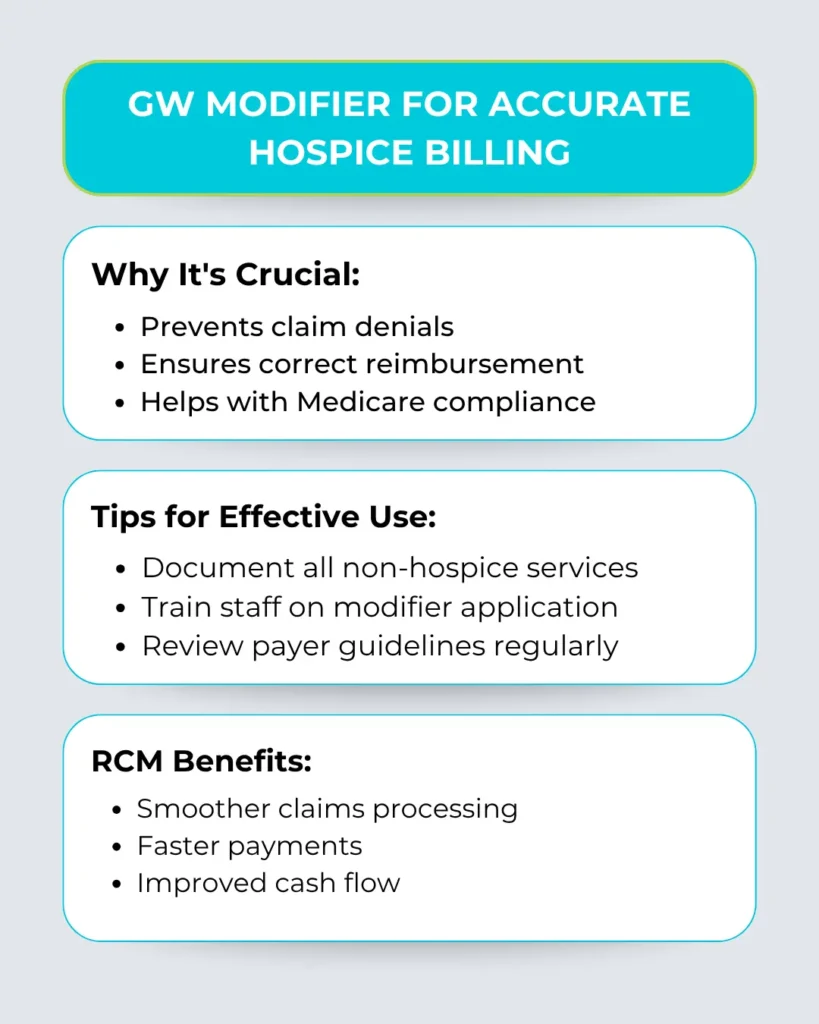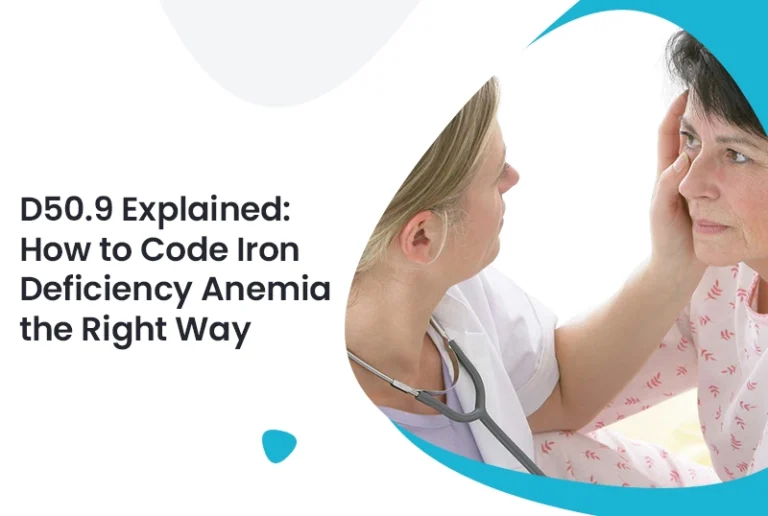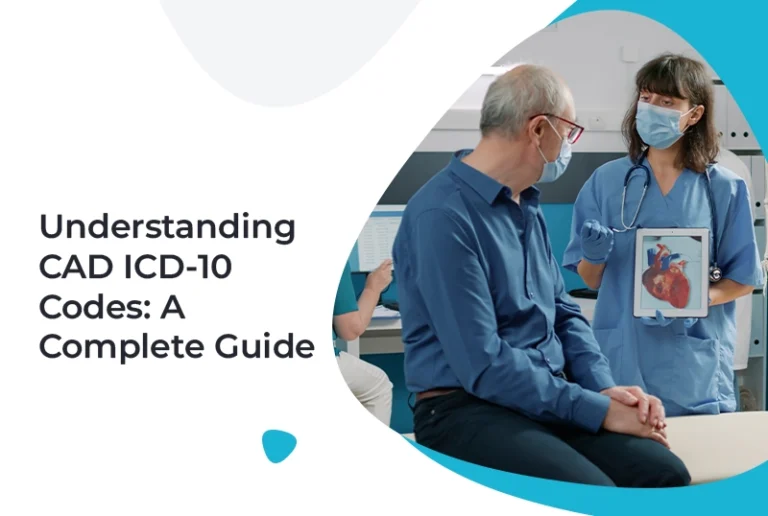For medical practitioners involved in hospice care, accurate billing is key to ensuring timely reimbursements and maintaining compliance with healthcare regulations. One critical tool in this process is the GW modifier. This modifier plays an essential role in hospice billing, especially when patients receive services that are not related to their terminal illness.
Its purpose in hospice services, and why it’s crucial for correct billing and reimbursement. End of this, you will have a clearer understanding of how to apply the GW modifier effectively in your practice, ensuring proper medical billing and coding for your hospice services.
What is the GW Modifier?
In medical billing, the GW modifier indicates that a service provided to a hospice patient is unrelated to their hospice care. Hospice care typically focuses on providing comfort and symptom management for terminally ill patients. However, there are instances where a patient might require care for a condition unrelated to their terminal illness. In these cases, the GW modifier helps clarify that the service should be billed separately and is not covered under hospice benefits.
This modifier ensures that Medicare and other insurance providers do not mistakenly reimburse services that are outside the scope of hospice care. It is essential for keeping hospice billing accurate and preventing errors.
When to Use the GW Modifier
Here are some common scenarios in which you would apply :
- Non-terminal conditions: If the patient receives treatment for a condition unrelated to their terminal illness (e.g., a broken bone or an unrelated infection).
- Routine care vs. medical treatment: If the service involves medical treatment rather than routine hospice care, such as an emergency room visit for an injury or illness not related to the terminal condition.
Examples of When to Use the GW Modifier:
- A hospice patient visits the emergency room for a broken leg unrelated to their terminal illness.
- A patient with a terminal illness needs treatment for acute pneumonia that is not part of their end-of-life care.
In both cases, the GW modifier helps ensure that the billing is accurate, preventing confusion between hospice care services and other medical treatments.
Why the GW Modifier Matters for Hospice Billing
1. Accurate Billing and Reimbursement
The primary reason for using the GW modifier correctly is to ensure that hospice services are billed accurately. Hospice care is typically billed differently from other types of care. By using the GW modifier, you differentiate between services related to the hospice care plan and those that are not. This helps ensure correct reimbursement for non-hospice services.
Without the GW modifier, there is a risk of having claims denied or underpaid, as insurance companies and Medicare may mistakenly categorize the non-hospice services as part of the hospice benefit.
2. Compliance with Regulations
Hospice providers must follow strict billing guidelines to remain compliant with Medicare and other insurance regulations. Using the GW modifier helps maintain compliance by ensuring that only services directly related to the hospice care plan are reimbursed under hospice benefits. This prevents any issues with audits or financial penalties related to improper billing.
3. Avoidance of Billing Errors and Denials
Using the GW modifier correctly helps reduce the risk of billing errors. When this modifier is used, it communicates to the payer that the services are unrelated to hospice care. This prevents potential claim denials and avoids the need for rework or resubmission.

How to Apply the GW Modifier Effectively
1. Proper Documentation
To use the GW modifier correctly, it is essential to maintain proper documentation for each service provided. The documentation should clearly state the reason the service is unrelated to the patient’s terminal illness. Additionally, ensure that the patient’s medical records reflect the non-hospice-related care provided.
2. Train Your Billing Staff
Proper use of the GW modifier requires that your billing staff understand when and how to apply it. Regular training and education on hospice modifiers and billing codes will help reduce errors. It’s also important to ensure your billing team is familiar with the criteria for non-hospice-related services.
3. Review Payer Policies
Different payers, including Medicare and private insurance companies, may have specific guidelines regarding the GW modifier. Review payer policies regularly to stay up to date on any changes in billing practices or requirements. This will help ensure that your billing remains compliant with each insurer’s standards.
The Role of the GW Modifier in Revenue Cycle Management
Effective use of the GW modifier plays a vital role in your practice’s revenue cycle management (RCM). It ensures that your hospice claims are processed correctly and that you receive the proper reimbursement for non-hospice-related services. By minimizing errors and speeding up claims processing, it helps improve cash flow and reduce administrative burdens.
Working with a medical billing company that specializes in hospice billing can help optimize your RCM process. These professionals ensure that modifiers, like the GW modifier, are applied correctly and that your claims are submitted in compliance with payer regulations, leading to quicker reimbursements and fewer claim rejections.
Conclusion
Using the GW modifier is vital to ensure that services not related to hospice care provided to hospice patients are billed correctly. By using this modifier correctly, you can reduce billing mistakes, prevent claim rejections, and enhance the reimbursement process for your practice.
To optimize your hospice billing and ensure prompt, accurate payments, consider collaborating with a medical billing company that specializes in hospice care. Their expertise in handling hospice modifiers can improve your practice’s revenue cycle management (RCM). Correct application of the GW modifier is a critical step in guaranteeing fair compensation for the services your practice delivers.
FAQs
Q: What is the GW modifier in hospice billing?
A: The GW modifier is used when a service provided to a hospice patient is unrelated to their terminal illness and should be billed separately.
Q: Why is the GW modifier important for hospice billing?
A: It ensures that non-hospice services are properly billed and reimbursed separately from hospice care, reducing the risk of errors, denials, and audits.
Q: How does the GW modifier affect reimbursement?
A: Correct use of the GW modifier helps ensure appropriate reimbursement for non-hospice services and prevents claims from being denied or underpaid.
Q: When should I use the GW modifier?
A: Use It when a patient receives non-hospice-related services, such as treatments for conditions not associated with their terminal illness.
Q: Can I avoid audits with the proper use of the GW modifier?
A: Yes, using It properly helps ensure compliance with regulations and reduces the likelihood of audits or financial penalties.







